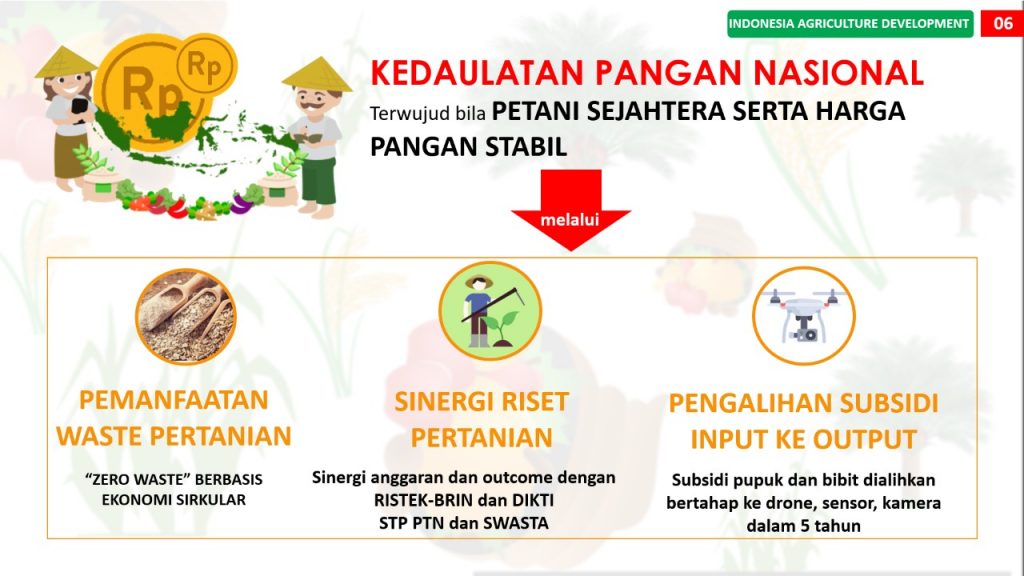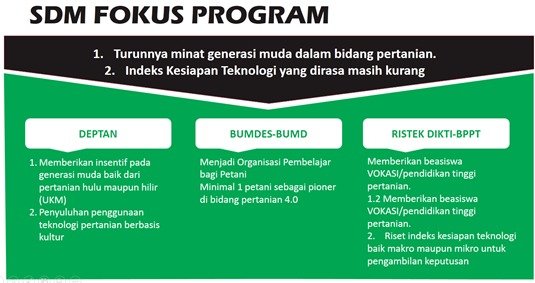ITS Give Recommendations For National Food Security In Post Covid-19 Pandemic
ITS Campus, ITS News – Covid19 pandemic currently has impacts on many sectors, one of which in the food security in the agriculture sector is predicted to be the trending issue. It encourages the Institut Teknologi Sepuluh Nopember (ITS) through the Centre for Public Policy and Business (PKKPBI) to release recommendations on the redefinition of the role of the government in handling problems in the agriculture sector.
This recommendation is also based on the prediction model of Covid-19 Pandemic directed by the professor from Bogor Agricultural University (IPB) who recommend to beware of food security which can increase food price.
The head of PKKPBI ITS Dr. Ir Arman Hakim Nasution MEng stated strategic issues relating to the problems in the agriculture sector can be outlined in institutional issues, human resources (HR), and information technology. All three need to be aligned so that the national agricultural resilience system is able to bring out qualified agricultural productivity.

Dr. Ir. Arman Hakim Nasution presented the material in the Focus Group Discussion (FGD) on post COVID-19 Pandemic National food Security conducted online on Monday (13/4)
Nowadays, said Arman, the still remain normal and safe. The assessment is based on the rice inventory which is still good because Indonesia is about to enter the harvest period. However, the scarcity is will occur not only on the commodity of rice. “Therefore, there is a need for planning a system that can build food security post-COVID-19,” he continued.
The post Covid-19 definition was the time after the culmination of the Covid-19 pandemic. Reading the results, he said that the beginning or middle of May to the next June is the peak of this pandemic. Readiness to face unwanted possibilities will depend on the planning system of farming.

Overview of efforts in realizing the national food security for post Covid-19
National food security at that time will be realized when the welfare of farmers and food price stability is controlled. “Meanwhile, the problem of farmer groups that do not have an optimal organizational structure today needs to be taken care of,” he explained. As a solution, Arman said that the Farmer Empowerment Program as the main perpetrator of the agricultural sector.
Efforts to support this food security will be helped by the many human resources found in Indonesia. Retrieving sample data in East Java area, the proportion of small and medium business (UKM) in the agro field reaches 58.8 percent. “The magnitude of their proportions demonstrates the importance of their role,” he said. With this amount, he continued, they can affect the availability of proper materials and food prices in urban areas.
In addition to human resource conditions, said Arman again, the most prominent problem is the use of mechanical machinery technology in the agriculture sector. The lag in this sector will increase production costs. Therefore, Arman advised changing the government subsidies to not just merely subsidizing the needs of seedlings, but subsidizing the technology.
After establishing the systemic subsidies precisely, farmers as the main actors in the agricultural sector should also be trained. “So, the output of farmers slated to be intelligent human resources and adaptive to the advancement of technology.” said the lecturer of the Department of Business Management ITS.
To build the creation of knowledge-based intelligent farmers, according to Arman, there are at least three focus programs that can be done. “We named it SDM Focus Program,” he called. The three focus lies in the hands of the government in the Ministry of Agriculture, BUMN-BUMDES, and the Ministry of Research and Technology (KEMENRISTEK).

Chart of human resource ideas focus programs from ITS for national food security post-Covid-19
The Program is also designed in line with the interest of younger generations in the agricultural sector, as well as the technological inequality in the sector. The step that is taken to run the Human resources Focus Program should be conceptualized to be able to run and target the young millennials.
“Hopefully, their interest in this field emerged and able to work with modern management, so that the quality of farmers increased and became productive,” he replied.
According to the data at the Ministry of Cooperatives and SMEs (Kemenkop UKM), the millennial farmer is only 8 percent from 33.4 million farmers in Indonesia. “So, if the proportions can be strengthened up to 15 percent, will greatly boost our food security,” said alumnus Asian Institute of Technology Bangkok, Thailand. Because, cloning young entrepreneurs is believed to have high product prices, as well as extensive networking.
The procurement of tuition cost incentives to attract these millennials needs to be improved, to be created by Sustainable Agriculture Conditions. “Kementan in collaboration with BUMN-BUMDES and Kemenristek can also promote the procurement of scholarship-based Training 4.0 technology,” he added.
The millennial sociopreneur, said Arman, can also be done through the big data opportunity of the implementation of the smart farming platform. The good Big data will be an asset that can be used to create a dynamic simulation prediction model. With the analysis data model that is no longer just linear, it is expected to help minimize the risk of complex agricultural sector problems. “Let’s work hard together to make the post-COVID-19 era as the rise of our strategic industry, including the agricultural industry,” he said.
ITS recommendation is the result of a formulation in the Focus Group Discussion (FGD) titled Food security in post Covid-19 which has been held by PKKPBI ITS Online on Monday (13/4). “We will deliver (recommendation) to the national level, next week to Kemenko economy and Kemenko PMK via Vicon (video conference),” Arman said.(qaf/rev/ITS Public Relations)
Related News
-
Gains Up 300 Percent, ITS Targets Increase in Scholarship Recipients
ITS Campus, ITS News – In the period 2020 – 2023, the scholarship disbursement budget collected by Institut Teknologi
April 14, 2020 21:04 -
Gains Up 300 Percent, ITS Targets Increase in Scholarship Recipients
ITS Campus, ITS News – In the period 2020 – 2023, the scholarship disbursement budget collected by Institut Teknologi
April 14, 2020 21:04 -
ITS students attend an international oil and gas conference in Saudi Arabia
ITS Campus, ITS News – Students from the Department of Ship Systems Engineering at Institut Teknologi Sepuluh Nopember (ITS)
April 14, 2020 21:04 -
ITS students attend an international oil and gas conference in Saudi Arabia
ITS Campus, ITS News – Students from the Department of Marine Engineering at Institut Teknologi Sepuluh Nopember (ITS) became
April 14, 2020 21:04
